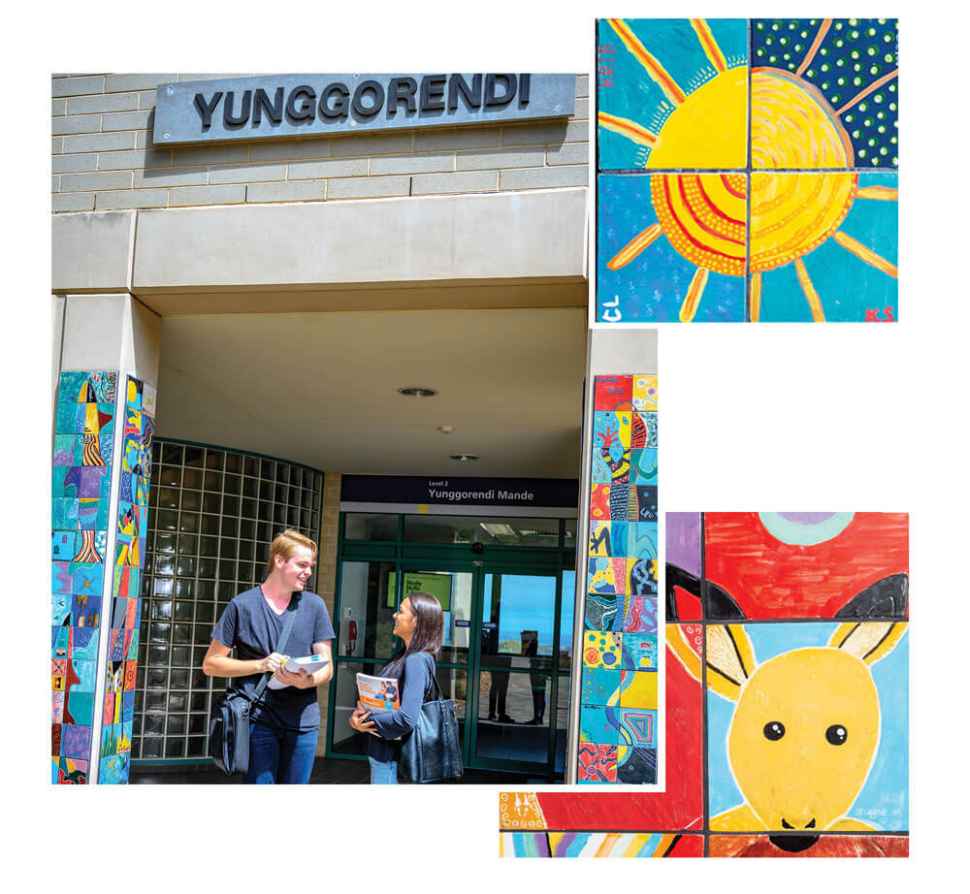What Reconciliation means to Flinders Community
Flinders University’s collective vision is to foster an environment that recognises and embraces Aboriginal and Torres Strait Islander peoples, knowledges and cultures. This vision for reconciliation is grounded in the concepts of togetherness, reciprocity, and respect.

Relationships
Flinders University respects and recognises the long-held philosophies, knowledges, research, strengths and contributions of Aboriginal and Torres Strait Islander communities in this country. As a University community we commit to reconciliation as part of everyday practice and acknowledge the vital role it plays in building understanding and acceptance of our shared histories, as we work towards a shared future.
We understand that respect and cultural humility are fundamental to establishing and sustaining a diverse, inclusive and values-based community.

| Action | Deliverable | Timeline | Responsibility |
|---|---|---|---|
| 1. Establish and maintain mutually beneficial relationships with Aboriginal and Torres Strait Islander stakeholders and organisations. | Meet with local Aboriginal and Torres Strait Islander stakeholders and organisations to develop guiding principles for future engagement. |
Aug 2020, Feb 2021,Aug 2021, Feb 2022 | Pro Vice-Chancellor (Indigenous) |
| Develop and implement an engagement plan to work with Aboriginal and Torres Strait Islander Stakeholders and organisations to understand research, education and community priorities, and identify how the University can meaningfully work in partnership toaddress these. | Dec 2020, 2021 |
Pro Vice Chancellor (Indigenous) |
|
Continue to build capacity in curriculum and content design through involving Elders and community leaders in program development. |
Dec 2020, 2021 |
Deputy Vice-Chancellor Students |
|
| Identify University Boards and Committees that require Aboriginal and/or Torres Strait Islander people’s representation. | Oct 2020, 2021 |
University Secretary | |
Develop an Indigenous Governance structure for the University, with internal and external representation, including Aboriginal and Torres Strait Islander stakeholders and organisations. |
July 2020, 2021 |
Vice-Chancellor and Pro Vice-Chancellor (Indigenous) |
|
| 2. Build relationships through celebrating National Reconciliation Week (NRW). |
Circulate Reconciliation Australia’s NRW resources and reconciliation materials to our staff and students. | 27 May - 3 June 2020, 2021, 2022 |
Executive Director, Office of Communication, Marketing and Engagement |
| RAP Working Group members to participate in an external NRW event. | 27 May - 3 June 2020, 2021, 2022 |
Chair, RAP Working Group | |
| Encourage and support staff and senior leaders to participate in at least one external event to recognise and celebrate NRW. | 27 May - 3 June 2020, 2021, 2022 |
College Vice Presidents and Portfolio Heads | |
| Promote NRW events to students. 27 May - 3 | 27 May - 3 June 2020, 2021, 2022 |
Deputy Vice-Chancellor Students |
|
| Develop an annual program of reconciliation events at Flinders University. | 27 May - 3 June 2020, 2021, 2022 |
Executive Director, Office of Communication, Marketing and Engagement |
|
| Register Flinders’ NRW events on Reconciliation Australia’s NRW website. | 27 May - 3 June 2020, 2021, 2022 |
Director, Marketing | |
| Provide advice for academic staff on how to promote National Reconciliation Week through their teaching and learning programs. | Oct 2020, 2021 |
Pro Vice-Chancellor, Learning and Teaching Innovation |
|
| Develop an annual active program of events in addition to NRW events to create a greater shared understanding of reconciliation, and to celebrate and educate our communities about Aboriginal and Torres Strait Islander languages, cultures, histories, and knowledges. | May 2020, 2021, 2022 |
Executive Director, Office of Communication, Marketing and Engagement |
|
| Host a University event (exhibition) to celebrate 20 years of Reconciliation Week. | 27 May - 3 June 2020 |
Director, Marketing | |
| 3. Promote reconciliation through our sphere of influence. |
Define what reconciliation means to Flinders University and develop a Communication Plan to internally and externally communicate our commitment to reconciliation. | July 2020, 2021 | Pro Vice-Chancellor (Indigenous) |
| Develop and implement strategies to engage our staff in reconciliation. | July 2020, 2021 |
Director, People and Culture | |
| Develop and implement strategies to engage our students in reconciliation. | August 2020, 2021 |
Deputy Vice-Chancellor Students |
|
| Explore opportunities to positively influence our external stakeholders to actively support reconciliation. | April 2020, Dec 2020 |
Executive Director, Office of Communication, Marketing and Engagement |
|
| Scope and list relationships with peak Aboriginal and Torres Strait Islander education bodies and collaborate to advance reconciliation, to share successes, areas of development and learn from each other. | August 2020, 2021 | Pro Vice-Chancellor (Indigenous) |
|
| Incorporate Aboriginal and Torres Strait Islander perspectives in the review of Flinders University policies and procedures. | July 2020, 2021 |
University Secretary | |
| Explore engaging with Reconciliation In Education Network for South Australia. | July 2020, 2021 |
Pro Vice-Chancellor Learning and Teaching Innovation |
|
| Promote Reconciliation Australia’s Narragunnawali: Reconciliation in Education online platform to all Initial Teacher Education staff and students. |
Semester 2, 2020, 2021 | Dean Education, College of Education Psychology and Social Work | |
| Invite Reconciliation Australia’s Narragunnawali team to deliver a public seminar about reconciliation to the University community. | November 2020, 2021 |
Director, Marketing | |
| Promote the Flinders University ratified Innovate Reconciliation Action Plan in Flinders in Touch (staff newsletter) and other communications channels encouraging staff to sign up to the Narragunnawali News mailing list. | May 2020, 2021, 2022 |
Director, Media and Communications | |
| 4. Promote positive race relations through antidiscrimination strategies. | Work with Aboriginal and Torres Strait Islander staff and/or advisors to review our Equal Opportunity policy to reference structural discrimination and explain how it affects Aboriginal and Torres Strait Islander people. Communicate this policy annually to students and staff. | August 2020, 2021 | Director, People and Culture |
| Review and revise all organisational policies and procedures to ensure that they demonstrate a consistent and active attention to our RAP commitments; the five dimensions of reconciliation; and Aboriginal and Torres Strait Islander cultural protocols. | November 2020, 2021 |
University Secretary | |
| Raise awareness, knowledge and comprehension amongst senior leaders, staff and students about the effects of racism through engagement in discourses on decolonisation, that is, the conscious effort to increase understanding and prioritisation of Aboriginal and Torres Strait Islander peoples’ cultures and values. | August 2020, 2021 | Pro Vice-Chancellor (Indigenous) |
|
| Review our staff awards programs to recognise achievements towards reconciliation and positive race relations. | August 2020, 2021 | Director, People and Culture |
Respect
Flinders University respects and recognises the long-held philosophies, knowledges, research, strengths and contributions of Aboriginal and Torres Strait Islander communities in this country. As a University community we commit to reconciliation as part of everyday practice and acknowledge the vital role it can play in building understanding and acceptance of our shared histories, as we work towards a shared future.
We will demonstrate respect by partnering with Aboriginal and Torres Strait Islander staff and students, and with Aboriginal and Torres Strait Islander communities more broadly, to develop a culture of trust, empowerment and a shared sense of purpose.
We understand that respect and cultural humility are fundamental to establishing and sustaining a diverse, inclusive and values-based community.

| Action | Deliverable | Timeline | Responsibility |
|---|---|---|---|
| 5. Increase understanding, value and recognition of Aboriginal and Torres Strait Islander cultures, histories, knowledge and rights through cultural learning. |
Consult relevant Elders and other Traditional Owners and/or Aboriginal and Torres Strait Islander advisors on the development of a cultural learning strategy for our staff. | November 2020 |
Pro Vice-Chancellor (Indigenous) |
| Cultural learning: a) Conduct a review of cultural learning needs within Flinders University, b) Provide opportunities for RAP Working Group members, People and Culture Business Partners, and other key leadership staff to participate in formal and structured cultural learning, and c) communicate and promote opportunities for cultural learning for staff and students. | June 2020 | Director, People and Culture | |
| Develop, implement and communicate a cultural learning strategy for our staff. | Jun 2020, 2021 |
Pro Vice-Chancellor (Indigenous) |
|
| Continue to deliver, and commit to broadening the reach of Aboriginal and Torres Strait Islander cultural content so that all students encounter and engage with Aboriginal and Torres Strait Islander cultural content as integral part of their course of study. | December 2021 |
Deputy Vice-Chancellor Students |
|
| Promote Universities Australia’s Indigenous Strategy 2017-2020 Good Practice Principles for embedding Aboriginal and Torres Strait Islander peoples’ histories, cultures and knowledges within the curriculum. | November 2020 |
Deputy Vice-Chancellor Students |
|
| In line with the Universities Australia Indigenous Strategy 2017-2020 ensure that all internal course and accreditation processes formally involve Indigenous consultation or input. | June 2020 | Deputy Vice-Chancellor Students |
|
| Continue to develop our library of resources authored and/or collaboratively developed by Aboriginal and Torres Strait Islander people. | August 2020, 2021 | University Librarian | |
| Leverage the University’s special collections, including the nationally significant collection of Aboriginal and Torres Strait Islander art collection, and the Don Dunstan collection to assist in driving cultural learning. | August 2020 | Director, Flinders University Art Museum | |
| Develop Guiding Principles for future campus development around the Flinders Village that reflect the University’s commitment to Aboriginal and Torres Strait Islander peoples, and where appropriate incorporate in the design of cultural spaces for the community that recognise and build on Aboriginal and Torres Strait Islander peoples’ ways of connecting with place and valuing the environment. | October 2020 | Vice President Corporate Services |
|
| 6. Demonstrate respect to Aboriginal and Torres Strait Islander peoples by observing cultural protocols. | Develop, communicate and implement cultural protocol to increase staff understanding of the purpose and significance of cultural protocols, including protocols for Welcome to Country and Acknowledgement of Country. | July 2020, 2021 | Pro Vice-Chancellor (Indigenous) |
| Develop clear processes for engaging Aboriginal and Torres Strait Islander people to conduct Welcome to Country including a list of key contacts for organising and maintaining respectful relationships. | July 2020, 2021 | Pro Vice-Chancellor (Indigenous) |
|
| Invite a local Traditional Owner or Custodian to provide a Welcome to Country or other appropriate cultural protocol at significant events each year and include an Acknowledgement of Country or other appropriate protocols at the commencement of important meetings. | June 2020, 2021 | Senior Events Coordinator | |
| Explore the opportunity of engaging Elders in Residence, with particular priority given to the Poche Centre. | June 2020, 2021 | Vice President and Executive Dean, College Medicine and Public Health |
|
| 7. Build respect for Aboriginal and Torres Strait Islander cultures and histories by celebrating NAIDOC week. | Encourage RAP Working Group members to participate in an external NAIDOC Week event. | First week in July, 2020, 2021 | Chair, RAP Working Group |
| Review HR policies and procedures to remove barriers to staff participating in NAIDOC Week. | June 2020 | Director, People and Culture | |
| Develop and respectfully distribute a calendar of local and national dates (including NAIDOC Week) of significance to reconciliation, and to Aboriginal and Torres Strait Islander people in our community | First week in July 2020, 2021 | Executive Director, Office of Communication, Marketing and Engagement |
|
| Promote and encourage participation in external NAIDOC events to all staff. | Jul 2020, 2021 | Executive Director, Office of Communication, Marketing and Engagement |
|
| 8. Celebrate Aboriginal and Torres Strait Islander cultures and histories. | Celebrate and profile the achievements of our Aboriginal and/or Torres Strait Islander students through internal (Flinders in Touch) and external media. | May 2020, Dec 2020, May 2021, Dec 2021, May 2022 | Director, Media and Communication |
| Develop and respectfully distribute a calendar of local and national dates (including NAIDOC Week) of significance to reconciliation, and to Aboriginal and Torres Strait Islander people in our community. | First week in Jul 2020, 2021 | Executive Director, Office of Communication, Marketing and Engagement |
Opportunities
Flinders University’s strategic plan Making a Difference – The 2025 Agenda places People and Culture as its foremost priority, since our success depends on the achievements of our people, and it is our culture that will sustain that success into the future.
We will work in all areas of our core business to increase Aboriginal and Torres Strait Islander community participation, retention and success in higher education to reduce social and economic barriers and increase the health and wellbeing of Aboriginal and Torres Strait Islander peoples.
Championing diversity and equality of opportunity creates a vibrant, values-based community, and enriches the cultural fabric of the University.
We recognise that we have a responsibility for leadership in thought and in action that contributes to equity, equality, inclusiveness, respect and empowerment, and that this is not something to be achieved for, but with Aboriginal and Torres Strait Islander people. Through this Innovate RAP we will be increasing the cultural capabilities of graduates and connecting our graduates with the oldest continuing cultures, and thereby increasing awareness and respect for this, and future generations.

| Action | Deliverable | Timeline | Responsibility |
|---|---|---|---|
| 9. Improve employment outcomes by increasing Aboriginal and Torres Strait Islander peoples’ recruitment, retention and professional development. |
Build understanding of current Aboriginal and Torres Strait Islander staffing to inform future employment and professional development opportunities. | July 2020, 2021 |
Director, People and Culture |
| Review current engagement with Aboriginal and Torres Strait Islander staff on Chair, Flinders Indigenous Workforce Strategy Committee to strengthen our recruitment, retention and professional development strategy. | July 2020, 2021 |
Chair, Flinders Indigenous Workforce Strategy Committee | |
| Appoint an Indigenous Employment Coordinator in People and Culture | July 2020 | Director, People and Culture | |
| Review HR and recruitment procedures and policies to remove barriers to Aboriginal and Torres Strait Islander participation in our workplace: a) Investigate developing a casual register for Aboriginal and Torres Strait Islander applicants (similar to the generic casual register) b) Create an Expression of Interest register for Aboriginal and Torres Strait Islander people to register to be considered for any suitable position that may arise in the following 12 months c) Advertise job vacancies to effectively reach Aboriginal and Torres Strait Islander stakeholders. | June 2020, 2021 |
Director, People and Culture | |
| Monitor implementation of the University’s Employment Strategy for Indigenous Australians to ensure progress towards our target of Aboriginal and Torres Strait Islander staff comprising 3% of full-time equivalent University staff 1. | Mar and Sep 2020, 2021, 2022 |
Chair, Flinders Indigenous Workforce Strategy Committee | |
| Colleges and Portfolios to develop action plans for Aboriginal and Torres Strait Islander peoples’ employment as part of the Indigenous Workforce Strategy. | December 2020 | College Vice Presidents and Portfolio Heads |
|
| 10. Increase support for researchers of Aboriginal and Torres Strait Islander background. | Consult and develop a Research Strategy working with our community that reflects research topics relevant to Aboriginal and Torres Strait Islander peoples. | December 2020, 2021 | Deputy Vice-Chancellor Research |
| Explore the opportunity and feasibility of develop an early career academic pathways program and mechanisms for incentivising recruitment of Aboriginal and/or Torres Strait Islander PhD students. | December 2020, 2021 | Deputy Vice-Chancellor Research |
|
| Develop a mentoring program to match Aboriginal and Torres Strait Islander Early Career Researchers with Senior Researchers. | July 2020, 2021 | Deputy Vice-Chancellor Research |
|
| 11. Improve graduate outcomes by increasing the recruitment, retention and completion of Aboriginal and/or Torres Strait Islander students. |
Increase uptake of scholarships for students of Aboriginal and Torres Strait Islander peoples. | January 2020, July 2020, January 2020, July 2021 |
Business Manager, Office of Indigenous Strategy and Engagement |
| Review our recruitment and admission procedures to promote equal and equitable access for Aboriginal and Torres Strait Islander peoples with a target of increasing Aboriginal and Torres Strait Island participation rate of 1.9% by 2025. | January 2021,2022 | Deputy Vice-Chancellor Students | |
| Seek feedback from students of Aboriginal and Torres Strait Islander background currently accessing on campus accommodation on how they can be better supported, and review accommodation accordingly, particularly in light of the future campus development through the Flinders Village. | July 2020, 2021, 2022 | Vice President Corporate Services | |
| Increase opportunities for Aboriginal and Torres Strait Islander students to share their feedback and experiences relating to enrolment, teaching/learning, and assessment processes. | January 2021 | Pro Vice Chancellor (Indigenous) |
|
| Review relationships with secondary schools in our network and identify any opportunities to support school-tertiary educational transitions for Aboriginal and Torres Strait Islander students. | July 2020 | Director, Student Recruitment | |
| Review the Work Integrated Learning placement program to ensure appropriate relationships with industry professionals in our network to support education-workplace transitions. | June 2020 | WIL Manager | |
| 12. Increase Aboriginal and Torres Strait Islander supplier diversity to support improved economic and social outcomes. |
Develop and implement an Aboriginal and Torres Strait Islander Procurement Strategy. | July 2020 | Associate Director, Procurement Services |
| Review procurement practices to remove barriers to procuring goods and services from Aboriginal and Torres Strait Islander businesses. | November 2020, 2021 | Associate Director, Procurement Services | |
| Communicate to staff actions arising from the Aboriginal and Torres Strait Islander Procurement Strategy for procurement of goods and services from businesses owned and/or operated by Aboriginal and Torres Strait Islander peoples. | Dec 2021, May 2022 |
Vice President Corporate Services | |
| Develop commercial relationships with businesses owned and/or operated by Aboriginal and Torres Strait Islander people. | November 2020, 2021 | Vice President Corporate Services | |
| Investigate Supply Nation membership. | Nov 2020 | Pro Vice-Chancellor (Indigenous) |
Governance
| Action | Deliverable | Timeline | Responsibility |
|---|---|---|---|
| 13. Establish and maintain an effective RAP Working group (RWG) to drive governance of the RAP. |
Maintain Aboriginal and Torres Strait Islander peoples’ representation on the RWG. | May 2020, 2021, 2022 |
Chair RAP Working Group |
| Establish and apply a Terms of Reference for the RWG. | May 2020, 2021, 2022 |
Executive Officer, RAP Working Group | |
| Meet at least four times per year to drive and monitor RAP implementation. | May and Oct 2020, 2021, 2022 | Executive Officer, RAP Working Group | |
| 14. Provide appropriate support for effective implementation of RAP commitments. |
Define resource needs for RAP implementation. | May and Nov 2020, 2021, 2022 |
Chair RAP Working Group |
| Engage our senior leaders and other staff in the delivery of RAP commitments. | May and Nov 2020, 2021, 2022 |
Chair RAP Working Group | |
| Define and maintain appropriate systems to track, measure and report on RAP commitments. | May and Nov 2020, 2021 |
Manager, Equal Opportunity and Diversity | |
| Appoint and maintain an internal RAP Champion from the Senior Executive. | May 2020, 2021, 2022 |
Vice-Chancellor | |
| 15. Build accountability and transparency through reporting RAP achievements, challenges and learnings both internally and externally. |
Complete and submit the annual RAP Impact Measurement Questionnaire to Reconciliation Australia. | 30 September 2020, 2021 |
Pro Vice Chancellor (Indigenous) |
| Report RAP progress to all staff and senior leaders twice a year. | June, December 2020, 2021 |
Chair RAP Working Group, Pro Vice-Chancellor (Indigenous) | |
| Publicly report our RAP achievements, challenges and learnings, annually. |
June 2020, 2021 | Executive Director, Office of Communication, Marketing and Engagement |
|
| Investigate participating in Reconciliation Australia’s biennial Workplace RAP Barometer. | May 2020, 2022 | Director People and Culture | |
| 16. Continue our reconciliation journey by developing our next RAP. |
Register via Reconciliation Australia’s website to begin developing our next RAP. |
December 2021 | Executive Officer, RAP Working Group |
Long way home
Insight into the ‘tile’ artwork featured throughout the Reconciliation Action Plan and website.
Yunggorendi is a special place. For Indigenous students new to university life, just how special becomes clear on a day in February every year. Tables are set-up outside, food is prepared, old hands and new join to make friendships…and art.
Stories and laughter are shared and each participant marks the occasion by etching and painting a tile.
Each tile finds its place in a mosaic of styles and colours to celebrate creativity, diversity and unity of purpose. The parts form an emblematic whole to be built into the material and cultural fabric of the Yunggorendi building. A home-away-from home is imagined, inscribed and identified this way.
I know the comfort this small ritual engenders because my tile is there to see, touch and talk about whenever I feel the need. I was gifted a place at the table – as a non-Indigenous staff member – and have a mark fused into the marks of others in a large and growing totemic expression of community context. This way of making art is a testament to enduring presence. It lends authority to the transforming acts of teaching and learning in a place dedicated to belonging and community.
The distance between self and home can seem vast but there are days, for all of us who have been privileged to share the space, when the art of Yunggorendi brings home closer and shows a better way of being where and who we are.
Gus Worby
Emeritus Professor
Yunggorendi
First printed in 2011 in Long Way Home - A celebration of 21 years of Yunggorendi First Nations Centre

Each tile finds its place in a mosaic of styles and colours to celebrate creativity, diversity and unity of purpose. The parts form an emblematic whole to be built into the material and cultural fabric of the Yunggorendi building.
